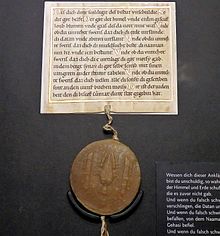Oath More Judaico
The terms in which the swearer called down upon himself invoked all the curses of Leviticus and Deuteronomy, the ten plagues of Egypt, the leprosy of Naaman and Gehazi (see 2 Kings 5), the fate of Dathan and Abiram, etc.
[citation needed] According to a recount in his "Gesammelte Schriften," the German-Jewish philosopher Moses Mendelssohn of the Enlightenment persuaded the Prussian government to moderate the terms of the oath during the 18th century.
The small German states gradually surrendered the most objectionable features of the oath: Hesse-Kassel (or Hesse-Cassel), in 1828; Oldenburg, 1829; Württemberg, 1832; Saxony, 1839 (on which occasion Zecharias Frankel published his famous "Die Eidesleistung"); Schaumburg-Lippe and Anhalt-Bernburg, 1842; and Hesse-Homburg, 1865.
The Jewish advocate Isaac Adolphe Crémieux won great fame by effecting the abolition of the oath through a case brought before the court of Nîmes in 1827.
Lazard Isidor, as rabbi of Pfalzburg, refused in 1839 to open the synagogue for such an oath; prosecuted for contempt of court, he was defended by Crémieux and acquitted.

